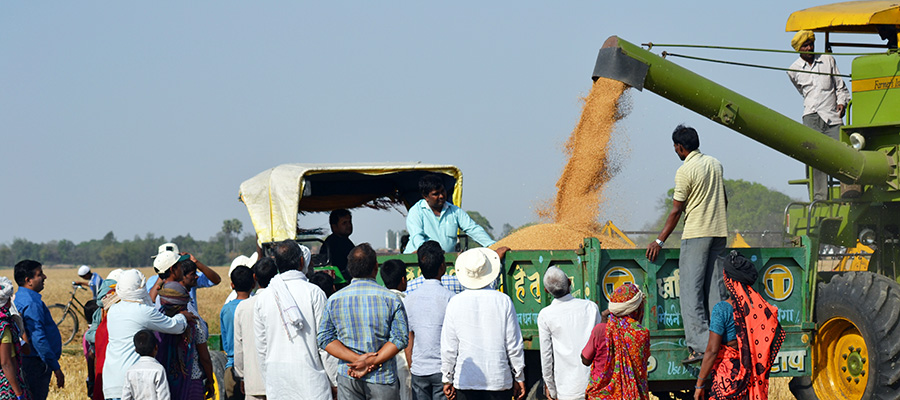Public Harvesting Boosts Farmers’ Confidence in Modern Agricultural Practices in Bihar, India
 Based on studies conducted by CSISA in Bihar and eastern Uttar Pradesh, early sowing of wheat – between 1 and 15 November – in combination with zero tillage and improved wheat varieties can help combat the negative impacts of terminal heat during the wheat maturing stage and increase yields. To demonstrate the benefits of early wheat sowing, CSISA in collaboration with the Bihar and Uttar Pradesh Departments of Agriculture organized public wheat harvesting events this year in Buxar and Sant Kabir Nagar districts, respectively.
Based on studies conducted by CSISA in Bihar and eastern Uttar Pradesh, early sowing of wheat – between 1 and 15 November – in combination with zero tillage and improved wheat varieties can help combat the negative impacts of terminal heat during the wheat maturing stage and increase yields. To demonstrate the benefits of early wheat sowing, CSISA in collaboration with the Bihar and Uttar Pradesh Departments of Agriculture organized public wheat harvesting events this year in Buxar and Sant Kabir Nagar districts, respectively.
“Such demonstrations help create confidence not only among farmers but also among scientists, many of whom still hesitate to change previous recommendations and adopt new practices,” says R.K. Malik, CIMMYT Senior Agronomist and CSISA Objective 1 leader. Traditionally, farmers in this region have been planting wheat after 15 November, or even in early December, which makes the crop vulnerable to rising temperatures. CSISA studies have shown that productivity progressively declines from >5.0 to less than 2.5 t/ha when planting is shifted from the first half of November to the last half of December.
In 2013, Bihar Department of Agriculture modified its official advisory to farmers to promote early wheat sowing and zero tillage technology based on evidence-based advocacy by CSISA. “It’s important to show the profitability and advantages of early sowing at the field-level in order to accelerate its adoption rate,” Malik added. CSISA’s field survey in 2013-14 indicated that more than 120,000 ha of wheat now benefit from timely planting in Bihar and eastern Uttar Pradesh.
In Buxar, the public harvest was organized in Kanouli village, on a plot where wheat was sown on 4 November last year using zero tillage technology. The grain yield of wheat recorded from this plot was 6.25 t/ha, which participating farmers noted was the highest wheat yield they have ever seen. Similarly, the plot in Daryiabad village of Sant Kabir Nagar, sown on 13 November, also recorded a high yield of 6.12 t/ha, prompting farmers to share that average yields recorded under conventional tillage technologies have only been 4-4.5 t/ha.
Ram Awadh Chaudhary, a 50-year-old farmer and service provider from Pokharbinda village, Maharajganj district in eastern Uttar Pradesh achieved yields of 6.5 t/ha last year and 6.0 t/ha this year after adopting early sowing and zero tillage. These yields are comparable to those of Punjab and Haryana and help reinforce farmers’ belief in new methods to improve productivity, according to Chaudhary.
With support from CSISA, Chaudhary has expanded his custom hire services into zero tillage, rotavating, laser land leveling, straw reaping and rice shelling. Across Bihar and EUP in 2013-14, an estimated 50,000 hectares of zero tillage wheat was sown by CSISA-supported service providers, reflecting an area increase of 42 percent over 2012-13.
